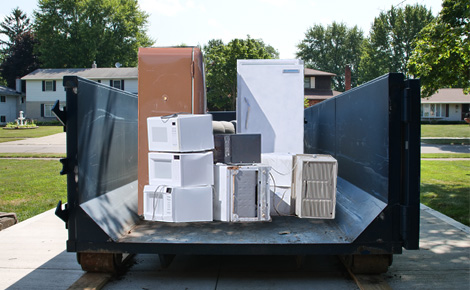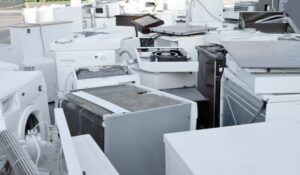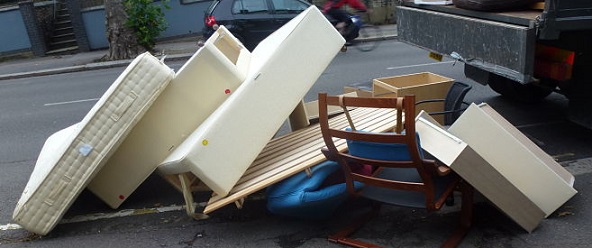In today’s fast-paced and sustainability-conscious business environment, companies must not only focus on growth and efficiency but also on their environmental responsibilities. One important, yet often overlooked, aspect of environmental responsibility is the proper disposal of old or broken appliances. Whether it’s a malfunctioning commercial refrigerator, outdated computers, or aging office air conditioners, disposing of business appliances can be a logistical and environmental challenge. Businesses must handle this process thoughtfully to comply with regulations, minimize environmental impact, and often, recover value from used equipment. Here are some strategies and considerations to guide businesses through appliance disposal in a responsible and effective manner.
Understanding the Need for Proper Disposal

Business appliances are not like everyday trash. Many contain hazardous components such as refrigerants, heavy metals, and electronic parts that can be harmful to the environment if not disposed of correctly. Additionally, these appliances often hold sensitive data or are made from valuable materials that can be reused or recycled. Simply sending them to a landfill can be wasteful, illegal in some regions, and damaging to a company’s reputation.
Regulations vary by location, but most jurisdictions enforce strict rules regarding the disposal of commercial appliances, especially electronic and refrigeration units. Non-compliance can result in fines and legal consequences. Understanding and adhering to local, state, and federal disposal laws is a critical first step.
Planning for Appliance Disposal in Advance
One of the best strategies a business can adopt is to plan for appliance disposal before it becomes urgent. Creating an inventory system that tracks the life cycles of major appliances can help companies prepare for replacements and avoid last-minute decisions. Knowing when a machine is approaching obsolescence allows time to research disposal options, schedule pickups, and notify relevant stakeholders.
Businesses should also consider integrating sustainability into their procurement practices by choosing appliances with longer lifespans, better energy efficiency, and recyclable components. Planning disposal from the moment of purchase helps close the loop on responsible equipment management.
Exploring Recycling and Donation Options
Recycling is one of the most effective methods of appliance disposal for businesses. Many manufacturers and third-party services offer take-back programs that ensure appliances are dismantled and their parts responsibly recycled. Partnering with certified e-waste recyclers ensures compliance with laws and helps businesses meet corporate social responsibility goals.
In cases where appliances are still functional but no longer meet the business’s needs, donating them to non-profits, schools, or community organizations can be a win-win solution. Donating extends the life of the appliance, keeps it out of the landfill, and may even provide tax benefits depending on local tax codes.
Working with Licensed Disposal Services
For large or complex appliances, especially those with hazardous materials like refrigerants or batteries, it is crucial to work with licensed and experienced disposal professionals. These services have the tools and certifications necessary to dismantle and remove equipment safely and in line with environmental regulations.
Outsourcing to professionals also minimizes the burden on internal teams and helps reduce liability. Businesses should verify the credentials and environmental policies of any disposal service they work with to ensure the process aligns with their sustainability objectives.
Securing Data on Electronic Appliances
 Modern appliances, especially smart office devices, can contain sensitive business data. Printers, copiers, computers, and even some HVAC systems may store information about operations, finances, or customers. Before disposing of any such equipment, businesses must ensure that all data is properly wiped or destroyed to avoid data breaches and protect confidential information.
Modern appliances, especially smart office devices, can contain sensitive business data. Printers, copiers, computers, and even some HVAC systems may store information about operations, finances, or customers. Before disposing of any such equipment, businesses must ensure that all data is properly wiped or destroyed to avoid data breaches and protect confidential information.
This step should be part of a company’s broader IT asset management policy, ensuring that all data-containing devices are sanitized or shredded before disposal or recycling. Partnering with ITAD (IT Asset Disposition) specialists can further secure this process.
Tracking and Reporting Environmental Impact
Many companies are now reporting on their environmental, social, and governance (ESG) practices. Responsible appliance disposal contributes positively to such reports. Keeping records of items donated, recycled, or professionally disposed of can help demonstrate a business’s commitment to sustainability. These records are not only useful for internal reporting but can also enhance a company’s image to clients, investors, and the public.
Some businesses may also benefit from sustainability certifications or awards that recognize eco-friendly practices, further incentivizing responsible disposal efforts.
 The first step in furniture removal is understanding what needs to go. It’s common to accumulate pieces over the years that no longer serve a purpose or suit your style. Start by walking through your home and identifying items that are broken, rarely used, or visually out of place. Beds, sofas, cabinets, chairs, and desks often top the list.
The first step in furniture removal is understanding what needs to go. It’s common to accumulate pieces over the years that no longer serve a purpose or suit your style. Start by walking through your home and identifying items that are broken, rarely used, or visually out of place. Beds, sofas, cabinets, chairs, and desks often top the list.
 Grief manifests in many ways, and for some, sorting through a loved one’s belongings can be a healing process. Touching familiar objects, recalling memories associated with them, and sharing stories with family members can become a form of remembrance and tribute. Though painful at times, the act of handling a loved one’s possessions often provides an opportunity to reflect and accept the reality of the loss.
Grief manifests in many ways, and for some, sorting through a loved one’s belongings can be a healing process. Touching familiar objects, recalling memories associated with them, and sharing stories with family members can become a form of remembrance and tribute. Though painful at times, the act of handling a loved one’s possessions often provides an opportunity to reflect and accept the reality of the loss. Grieving families already face a multitude of emotional and logistical challenges. Delaying the cleanout of an estate can add to the burden. Items may begin to pile up mentally and physically, becoming a source of stress rather than comfort. The longer the task is postponed, the more overwhelming it can feel.
Grieving families already face a multitude of emotional and logistical challenges. Delaying the cleanout of an estate can add to the burden. Items may begin to pile up mentally and physically, becoming a source of stress rather than comfort. The longer the task is postponed, the more overwhelming it can feel.